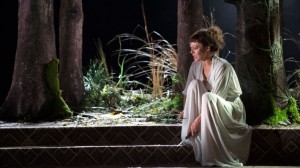Misogyny, hanging round our culture like a bad smell, has floated past my theatrical radar recently. From London, the critic Andrew Haydon boggled that Medea (‘pretty anti-woman propaganda, saying that they’re well nuts and a more than a bit witchy?’) and A Streetcar Named Desire (‘intensely woman-hating’) still received major revivals, calling out both plays as misogynist, with their protagonists on the wilder shores of damage. Across the globe, in Sydney, Alison Croggon wrote a finely considered response to Belvoir St Theatre’s production of Hedda Gabler with a male actor in the title role. Back in London, this time on the dance stage, a friend was troubled by Facada, a gleefully cartoonish piece performed by Russian stars Natalia Osipova and Ivan Vasiliev. She found Arthur Pita’s tale – revenge of the jilted bridezilla – cliched and, yes, misogynist.
Are Haydon and my pal correct? Does misogyny still preen centre stage? Croggan’s nuanced argument reminds us that the qualities of a production shift with each individual spectator. Who’s looking, what are they looking for, what do they see?
Maxie Szawlinska, my smart fellow critic on the Sunday Times, shared none of Haydon’s doubts. ‘You’re kidding, right?’ she tweeted. ‘Two staggeringly powerful critiques of the whole sex/gender system are misogynist?’ I haven’t yet seen Carrie Cracknell’s (widely praised) Medea with Helen McCrory at the National Theatre or Gillian Anderson as Blanche duBois in Benedict Andrews’ (lavishly lauded) Streetcar at the Young Vic (pictured above, by Johan Persson). I’ll report back in a few weeks. But my instincts here are with Szawlinska. It is their furious embrace of cultural stereotype that makes these plays and their heroines thrillingly radical.
The concept of a heroine, I learned as a student, didn’t exist in classical Greek. In Athenian tragedy, only a man could be heroic. A woman responding to her circumstances with guile and fury was a category error – which is no doubt why Euripides, messing with categories throughout his career, seized upon the character of Medea, brandishing her murderous rage and asking his audience to judge it as courageous, mad, monstrous, or all of the above.
The history of theatre is poor life choices in beguiling costume. As spectators, we don’t need to approve, or agree – but might feel that a character has unexpectedly opened a window on their heart. We don’t worry about flawed, flailing male protagonists in the same way as we do women. Hamlet, Lear, Oedipus, Prince Siegfried – each raised to rule, each letting power slip through their fingers and implicitly asking if it’s worth clutching. The masculine imperative – that says kill without consideration, disinherit without qualm, dump love in the trash as you march towards upwards – seems equally inadequate. For an audience, who have eyes but not skin in the game, it is easier to identify with the outsider.
Even the most privileged female character in classic western drama Is likely to be something of an observer of her world. She’ll be Lady Macbeth, achieving power by proxy; Rosalind, achieving ecstasy in crossdressed exile; or Hedda, suffocating as everything she ever wanted closes in on her. Characters learn the rules, break them or are broken by them.
Still, when does critique shade into a caricature? When does standing outside make you not outsider but outcast? When female protagonists go bad, they may do so in predictable ways, each with a slur attached. They become slut or harridan, bad mother or worse witch. Their strength can be painted as unnatural cruelty, their frailty as inevitable hysteria. With the rules stacked against them, sometimes an exit into extremity is the only strategy: Medea via matricide, Blanche into the madhouse. Their refusal or inability to remain in the world of their plays represents a profound critique of its fears and shallows.
Watching people do extreme things on our behalf – performing words and deeds that we’re too timorous to enact in our shadowy real lives – is a pleasure of spectatorship. Sympathy for the damned, or at least for the damaged. What we do with that sympathy once we leave the building is a whole other challenge.
Follow David on Twitter: @mrdavidjays



Leave a Reply